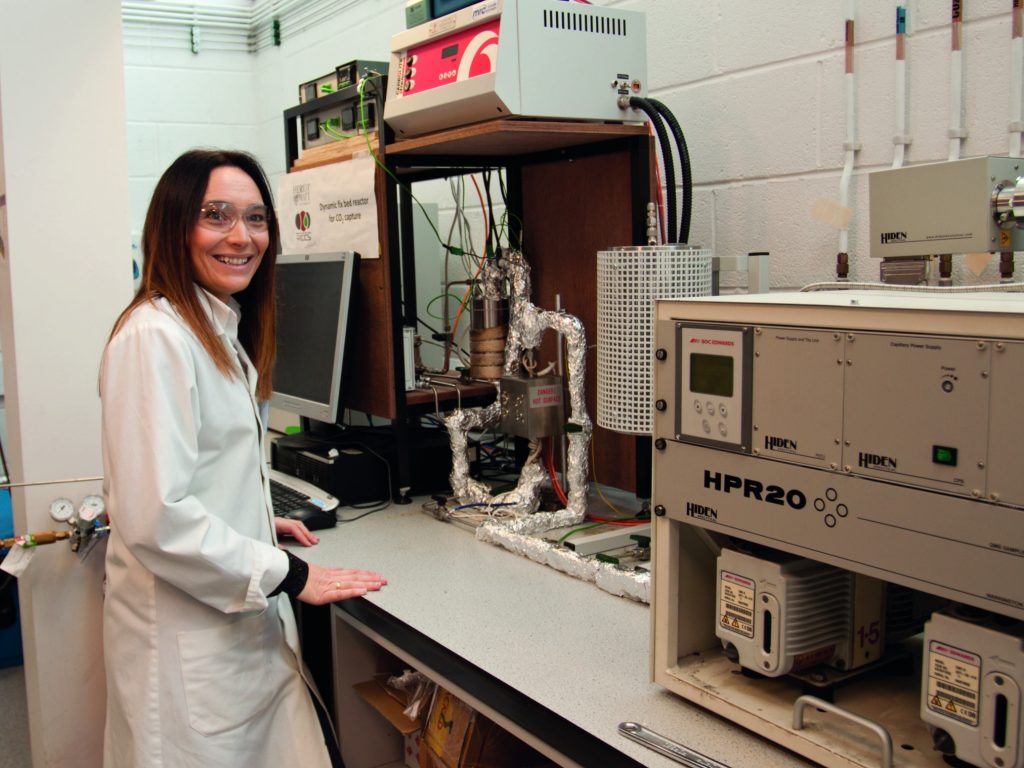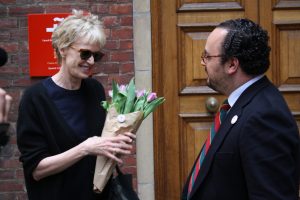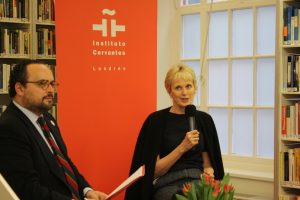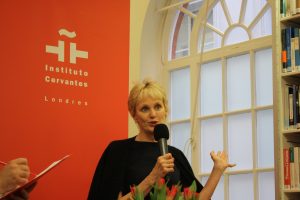Heriot-Watt researcher wins SRUK/CERU Award 2020 for the fight against climate change

Dr Susana García López has been awarded The Society of Spanish Researchers in the United Kingdom (SRUK/CERU) and Banco Santander Foundation the fifth edition Emerging Talent Award 2020.
The award was given for her excellent research career in the field of Chemical Engineering with the aim of solving one of the main environmental problems: the continuous release of the carbon dioxide (CO2) into the atmosphere by human activities such as the burning of fossil fuels and deforestation.
Dr García López, on winning the award, said: “Reducing CO2 emissions in the atmosphere is the greatest challenge our generation faces. One of the main source of CO2 emissions is the consumption of fossil fuels as well as various industrial processes. Having been born and raised in the Asturian mining coal basin, I have always witnessed the importance of coal for the generation of energy in our society. Pushing forward the required transition to clean and sustainable energy is the goal of my research. The recognition of this work by SRUK/CERU and Banco Santander Foundation is a great encouragement to continue our fight against climate change.”
A total of 24 nominations competed for the award this year, all of them of the highest level. The applications were reviewed by a committee made up of internationally renowned researchers.
With the fifth edition of the Emerging Talent Award SRUK/CERU’s commitment to support and to give visibility to Spanish scientists in the United Kingdom while fostering relations between the two countries, is consolidated. Carmen Sánchez Cañizares, president of this society has remarked: “The high level of applications received throughout the five editions of this award, which reflects the talent and excellent research carried out by Spanish scientist in the United Kingdom.
“Not only is Susana a young academic with an extraordinary career but we at SRUK/CERU are convinced she will be the perfect ambassador of the main values that our Society defends and an inspiring reference of the role of women in Spanish science.”
Borja Baselga, Director of Banco Santander Foundation said: “Susana’s excellent research career in clean energies combines and attempts to bring together basic and applied science, both in Spain and in the UK, in the fight against climate change. This award not only represents recognition of her achievements and the role of women in the Spanish I+D+I but will also encourage new international collaborations and inspire other young generations to continue their scientific careers. At least that is what we hope from Banco Santander Foundation by awarding it.”
Susana García López, Chemical Engineer from the University of Oviedo, Spain with a PhD from the University of Nottingham, developed the first experimental system to evaluate the storage of carbon dioxide in certain geological formations. Through collaborations with the United States Geological Survey and the University of Oregon, she has contributed to the development of computational models that, based on her experimental findings, could be applied to study in depth the geological conditions under which carbon dioxide can be stored.
She joined the Institute of Carbon Science and Technology (INCAR-CSIC) in Spain as a postdoctoral researcher to study the different aspects of carbon dioxide capture, returning to the United Kingdom in 2014 as an Assistant Professor of the department of Chemical Engineering at Heriot-Watt University. In 2017, she was appointed Associate Director at the Research Centre for Carbon Solutions (RCCS).
One of her most recent contributions is the design of new materials capable of capturing carbon dioxide more efficiently than those currently available.
Siri Hustvedt, the most feminist, ethical and Dickensian writer is awarded Princess of Asturias Award for Literature
American writer Siri Hustvedt, recipient of the Princess of Asturias Award for Literature 2019, said that the recognition was «a mixture of gratitude, surprise and happiness» at a press conference held at the Cervantes Institute in London, a city where ahe is promoting her most recent novel.
Hustvedt (Minnesota, United States, 1955) began the press conference by mentioning her father, who said that «grace is not something you deserve or that you have necessarily earned. The correct answer to grace is gratitude.»
The Jury for the Princess of Asturias Award for Literature 2019, meeting in Oviedo, Spain, said that Hustvedt’s work is one of the most ambitious on today’s literary scene. Employing a feminist perspective, she addresses a variety of facets that sketch a convulsive, disconcerting present.
Translated into more than thirty languages, Hustvedt is a scholar and intellectual who addresses the fundamental issues of contemporary ethics and epistemology. As well as being known for her feminist militancy, her work has contributed to interdisciplinary dialogue between the sciences and the humanities. She has published essays and articles in academic and scientific journals, including Contemporary Psychoanalysis, Seizure: European Neuropsychoanalysis and Clinical Neurophysiology.
The writer takes the baton from recent award winners, such as Fred Vargas, Adam Zagajewski or Richard Ford. Hustvedt confirmed that she will attend the award ceremony of the Princess of Asturias Award at the Campoamor Theater in Oviedo this autumn.
In her speech at the Instituto Cervantes in London, Hustvedt highlighted the role and need of feminism over the centuries, quoting the example of the text against misogyny written by Christine de Pizan in the 14th century. «The waves of feminism reappear, I think sometimes they do in connection with this clash we see with populism, deeply present in the United States and also in Spain, as we have been seen in the past elections, as well as in Germany and the East of Europe».
For Hustvedt, it is clear that feminism is needed because «history is not over» and also because for her it is a form of humanism. Furthermore she said «women, people who do not identify as either men or women, feel liberated with the ideas of feminism.»
«It is a privilege to have hosted such a great writer on one of the most important days of her career. The Princess of Asturias Award is one of the greatest literary awards in the world and we are delighted to have a key writer in the contemporary scene with us,”, said Ignacio Peyró, director of the Instituto Cervantes in London.
Hustvedt will travel to Manchester in the coming days, to Bath, and to Hay’s literary festival. She recalled the figure of the British writer Charles Dickens, on whom she wrote her doctoral thesis at university. «My passion for Dickens goes back many years before, when I was 13 and I read David Copperfield. It was that novel that made me read others. Dickens has a very deep place in my life, but it even goes back to my Norwegian grandmother, who read Charles Dickens in Norwegian over and over again. He was her favourite writer,” she admitted.





